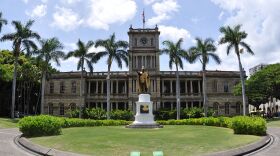President Donald Trump recently signed an executive order requiring colleges and universities that receive federal funding to guarantee protections for free speech on campus. But according to one expert, there is a long history of free speech being constraining and pushed to the limits on campuses in the U.S.
The President first proposed the action in 2017, when protests led the University of California at Berkeley to cancel a planned speech by controversial conservative speaker Milo Yiannopoulos.
Erwin Chemerinsky was there when it happened. He is the Dean of UC Berkeley's law school and also happens to be a nationally-recognized expert on the first amendment and campus free speech issues.
He says that although there are some unique differences today, challenges to freedom of speech on campuses are nothing new.
"Controversies on free speech on campus are not new. I think its a mistake to say today that all of a sudden we've discovered issues with regard to free speech on campus" Chemerinsky said.
He cites anti-communist probes during the McCarthy Era and anti-Vietnam War protests as two modern examples of the freedom of speech being challenged on campuses around the nation, including UC Berkeley.
Chemerinsky draws a distinction between university authorities attempting to limit the speech of students or outside groups and students expressing displeasure with a particular speaker.
"I have not problem with students signing a petition saying 'The person you invited to speak at commencement is unacceptable to us.' What I'm saying isn't permissible under the First Amendment, is for students to disrupt a speaker. So, if a speaker is shouted down so that he or she can't speak, that's not protected by the First Amendment."
Several high-profile comedians, including Jerry Seinfeld and Chris Rock, have started avoiding performances on college campuses because of what has been called "student hyper-sensitivity."
Chemerinsky admits that there are often social pressures not to take certain positions on campuses and in classrooms, but notes that is typically not a violation of the First Amendment, which precludes the government from enacting speech restrictions.
He says that it is the job of university administrators to combat those social pressures and allow students to express ideas and views from all perspectives.
Erwin Chemerinski is the author of Free Speech on Campus.



